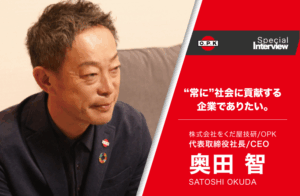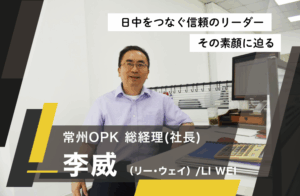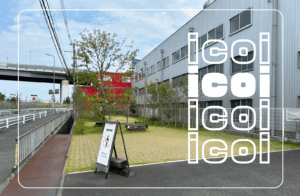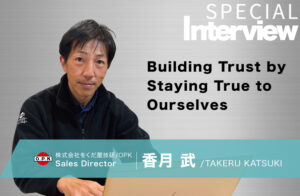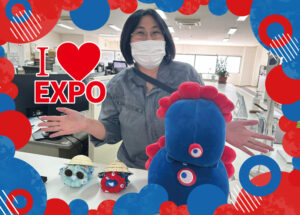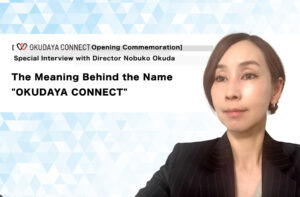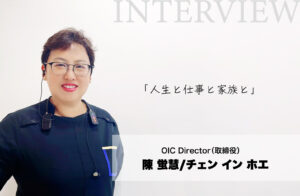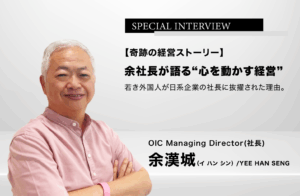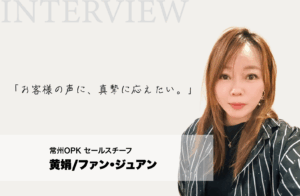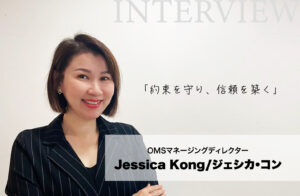"‘Always’ strive to be a company that contributes to society. For this, it's important to operate as a united team." ─ Okudaya Giken Co., Ltd. (OPK)
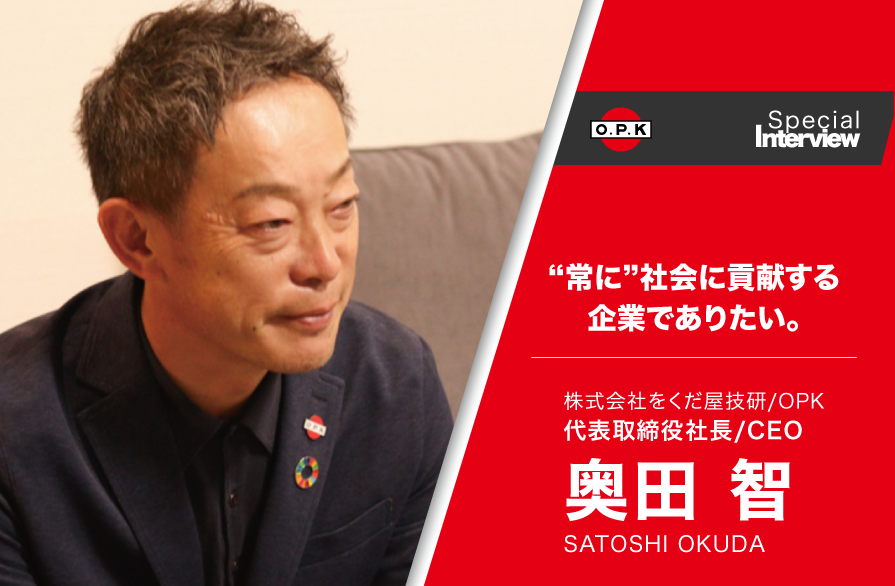
Special Interview / “Always” Strive to Be a Company That Contributes to Society
—What is Okudaya Giken’s vision?
Our goal is to “always be a company that contributes to society”. The key point is “always”. In this ever-changing world, it’s about whether we can rise to the challenge of being useful to society at all times. Long-term and perpetually. I feel this belief has been a consistent principle since the founder’s era.
—How do you specifically implement this vision?
Going back to when I was a managing director, it all started with a proposal for a “medium-term management plan” about what kind of company we wanted to be in 5 years, prompted by an email from someone who had been training with us for six months. Having learned about its importance from both internal and external sources, I proposed it and named it “WAKE UP”. The name has two main origins. When searching for a title that reflected our style for the “medium-term management plan”, I imagined what words our founder would have used if he were still alive. I thought he might have given us an encouraging shout like “Wake Up!” “Stand up!”
The other reason comes from Okuda Giken’s company philosophy: “Harmony forms character, and research is the foundation for company development”. If you combine the first two letters of “WA” (harmony) and “KENKYU” (research), you get “WAKE”.
—Has this idea permeated to the employees?
We created a 5-year plan with specific metrics including sales, profits, and materials used, which we named WAKE UP 68, developed with the management team and external consultants. However, it didn’t really take root in the company consciousness. For the next plan covering periods 69-73, “WAKE UP 73”, we had department heads and deputy managers (who are closer to the frontlines) take the lead in its creation.
—What did you realize after establishing the next “WAKE UP 73”?
The importance of knowing our current position in relation to the company’s ideal state. It’s about working backwards from where we want to be to what we need to do now. On the other hand, since the world is constantly changing, we need to make course corrections at times. A broad, bird’s-eye view is necessary. In particular, the phrase “bird’s eye view, insect’s eye view, fish’s eye view” resonates with me.
—What does that mean?
“Bird’s eye view” means being able to see from above = the ability to see the whole picture. “Insect’s eye view” means a grounded perspective = the ability to see the real current situation. “Fish’s eye view” is likening the river to the flow of time = the ability to look from the past to the future. You can’t create a “medium-term management plan” without these three perspectives.
—So you need opinions from people in various positions with diverse thoughts.
For example, there might be companies where a charismatic leader thinks about the future alone. But for Okudaya Giken, it’s crucial that we operate as an organization, with everyone involved. I don’t think this company needs a charismatic leader.
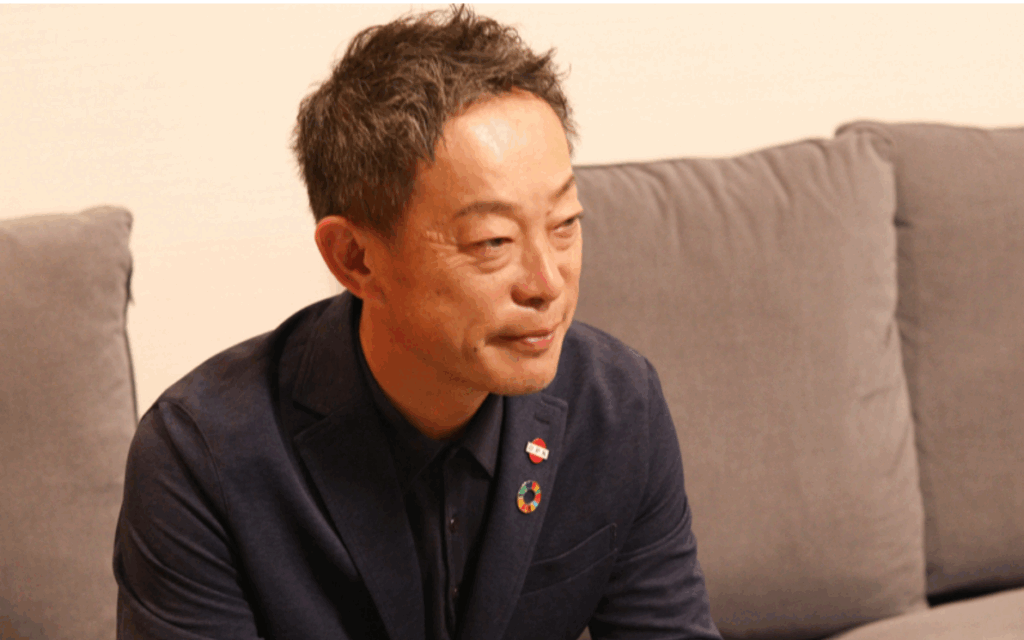
■ Okudaya Giken’s Challenges, Strategies,
and Strengths: Valuing Work-Life Balance while
Looking towards Post-2030, Becoming a Company that Safeguards the Future.
—Do you have any challenges or strategies you want to tackle in the future?
What we’ve been working on these past few years is creating products that are useful in any environment. With that in mind, we donated products to the “Osaka-Kansai Expo” from three perspectives: 1) We want to be useful as an Osaka manufacturing company, 2) We want to experience and get excited about our products being useful at the Expo site, and thirdly, donating to the Expo is actually not an easy task. We have to submit documents and go through interviews considering various conditions like whether the company is environmentally conscious, whether the products are environmentally friendly, and so on. The Expo team that makes these selections is basically composed of secondees from global Japanese companies, who will return to their companies after the Expo. Given this flow, it’s not an exaggeration to say that the selection criteria shown at the Expo will become the central thinking in the future world. Being able to encounter this way of thinking through our donation was a significant benefit.
—Have you realized anything through these strategies?
SDGs and ESG (management policies aimed at addressing environmental and social issues and improving corporate governance structures essential for long-term corporate growth) need to be included in management policies as a global trend. Especially for ESG, companies that don’t implement it can’t even receive loans from banks. As for SDGs, these are global goals to be achieved by 2030, so we need to start thinking now about what will be required beyond 2030.
—Specifically?
It’s about working towards carbon neutrality (a state where the overall emission of greenhouse gases causing global warming is reduced to zero). For the “hydraulic transport equipment” that Okudaya Giken handles, we’ll be questioned about what energy and materials we use to make it, and what it will be used to move. Future corporate management will need to consider these aspects.
—What’s the solution?
One thing we’ve managed to achieve is supplementing power with solar energy. At our new headquarters factory, we’ve introduced a PPA (Power Purchase Agreement) to generate about 6% of our power, and we’re having the power company supply us with electricity from renewable energy sources. This allows us to cover all the electricity used in the factory with renewable energy, leading to environmentally conscious manufacturing. The UN is now describing the current state of the Earth’s environment not just as global warming, but as “global boiling”. If the Earth’s temperature rises even a few more degrees, we’ll be in an environment that human power can’t do anything about. It’s our children’s generation, or perhaps our grandchildren’s, that will be affected. To avoid this, each and every company must do its best. That’s the future we aim for as our grand vision.
I Believe that Environmentally Appropriate Manufacturing, like our “Pastel Series”, is a Natural Role for Okuda Giken.
—Was the environmentally friendly transport equipment “Pastel Series” developed from this perspective?
The “Pastel Series” uses “water-based control fluid” instead of conventional hydraulic oil, contributing to the reduction of marine pollution and CO2 emissions. This allows us to deliver to customers who couldn’t use our previous products. I think being an organization that can propose such options is what a company should be. We’re currently working on environmentally appropriate manufacturing like the “Pastel Series”, considering it Okudaya Giken’s natural role.
—Anything else?
We’re also focusing on after-sales maintenance, preparing to detect issues “before” things break down. If repairs are only done after a breakdown, it becomes a problem of how to handle the transport work (previously done with Okudaya Giken’s hand pallet trucks) during the repair period. We consider this our responsibility too, so we’re preparing software for individual management that can send alerts suggesting parts’ lifespans and repair timings to prevent such situations.
—What do you think are Okudaya Giken’s strengths that allow you to continue such challenges and strategies?
It’s how each employee approaches their work. We have members who all have a strong sense of responsibility towards their jobs.
Next time, President Okuda Special Interview Vol.2
■ Okudaya Giken’s Internal Innovation
Entrusting unique internal projects to create an environment
that nurtures staff with the power to move towards desired goals.
Interview Date: April 2025
Interview Cooperation:
Okudaya Giken Co., Ltd.
President and CEO Satoshi Okuda

